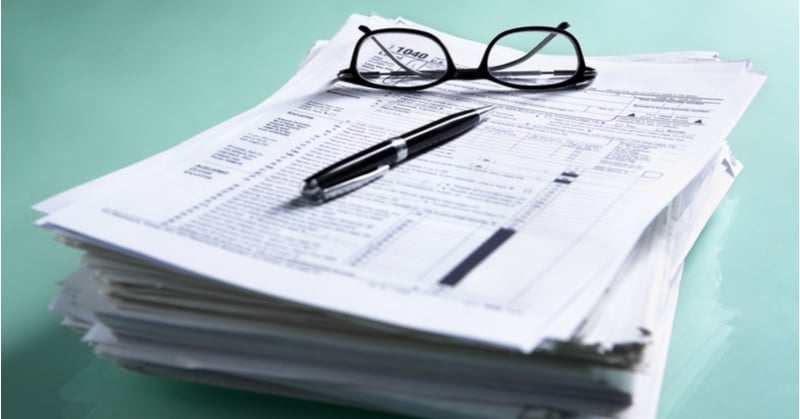As an accountant, you know that accounting forms are both oh-so-important and numerous. With so many forms to keep track of, you may consider giving your clients a rundown of the various forms to keep things running smoothly. Let’s take a look at the 12 accounting forms your clients should know.
Important accounting forms to know
Because you handle their books, your clients may think they do not need to know about accounting forms. However, that’s not the case. Some forms are very important for your clients to know, including:
- Income reporting, expense, and income tax forms
- Estimated tax filing forms
- Deduction forms
- 1099 payment forms
Your clients should know about the different accounting forms. Why? Knowledge of the basic accounting forms can help your clients:
- Make informed financial decisions
- Understand and gather information for each form
- Keep track of due dates
- Avoid late fees or penalties
- Streamline the filing and depositing process
Take a closer look at the accounting forms your clients should know about below.
Income reporting, expense and income tax forms
Forms that report things like income taxes or how much a company earns or spends are a must-know for your clients. Here are some income and expense forms your clients should be aware of. Keep in mind these vary based on business structure.
Schedule C
Schedule C, Profit or Loss from Business, reports the total amount your client earned or lost during the tax year. If any of your clients are a sole proprietor or the only owner of a limited liability company (LLC), they must file Schedule C.
Your client must attach Schedule C to Form 1040 when they file their personal returns. Even if you file both business and personal tax returns for your clients, they will need a copy of both for their records.
Clients need to give you their balance sheet, profit and loss statement, inventory information, and any expense details for Schedule C.
Clients must file Schedule C and Form 1040 by April 15 each year (May 17 for 2021) if they earn more than $400 in net profits during the tax year.
Schedule SE
In addition to Schedule C, sole proprietors and single-member LLCs typically must complete Schedule SE, Self-Employment Tax. Schedule SE helps your client calculate what they owe in self-employment tax.
Your client must also file Schedule SE by April 15 each year.
Schedule K-1
Multi-member LLCs and partnerships report their income on Schedule K-1 (Form 1065), U.S. Return of Partnership Income.
Make sure all partners know what Schedule K-1 is and that their partnership is a pass-through entity. Partners should know that they need to report their portion of the business’s income and expenses on their personal income tax returns.
All members or partners must file Schedule K-1. Let them know to attach the form to Form 1065 and file by April 15. If you file for your clients, give them copies for their records.
Form 1120
Clients structured as corporations need to file Form 1120, U.S. Corporation Income Tax Return, to report their income and expenses. Form 1120 helps calculate the business’s federal income taxes.
Your client needs to know the due dates for Form 1120 so they can give you any necessary information for filing. Corporation tax returns are due on the 15th day of the fourth month after the company’s fiscal year ends.
If you have multiple clients who file as corporations with different fiscal year-end dates, make sure to give your clients a heads up on when their taxes are due. This allows your clients to provide you with all financial records in a timely manner so they (and you) don’t miss a deadline.
Form 1120-S
If you have a client whose business structure is an S corporation, or S Corp, they only pay taxes on their personal income. S Corp clients need to file Form 1120-S, U.S. Income Tax Return for an S Corporation.
Form 1120-S is due March 15 each year because S Corps typically have a fiscal year-end date of December 31. S Corp clients need to know Form 1120-S so they can compile all personal income information for you if you file this form for them.
Estimated tax filing forms
Some of your clients may need to file estimated taxes throughout the year. In that case, they need to know which forms you file for them (if applicable) and their estimated tax liability.
Form 1040-ES
All self-employed individuals who send estimated taxes to the IRS need to use Form 1040-ES, Estimated tax for Individuals, if their tax liability is $1,000 or more for the year.
Clients must pay estimated taxes by April 15 of each year. Or, they can opt to pay them in four equal installments throughout the year. The first installment payment is due when they file their personal return.
Form 1120-W
Corporations report estimated taxes on Form 1120-W, Estimated Taxes for Corporations. The form is due by April 15 each year. Only file Form 1120-W if your client’s corporation has a tax liability of $500 or more for the tax year.
Educate your clients about Form 1120-W so they know how much estimated tax to pay and when.
Deduction forms
In most cases, your clients claim deductions for expenses on their tax forms. Pre-2020, you may have had select clients who claimed office expenses. But post-2020, you may have more clients who are eligible to claim the home office tax deduction. This is where Form 8829 comes in.
Form 8829
With so many businesses adapting to work-from-home post-COVID-19, Form 8829, Expenses for Business Use of Your Home, might be brand new to some (or all) of your clients.
Clients who file Form 8829 need to determine what business expenses they can deduct. Teaching your clients about Form 8829 can help your clients gather the necessary documents to help you file the form accurately.
Remember to inform your clients that they must file Form 8829 with their personal tax return if you do not handle their personal taxes.
1099 payment forms
Clients who have independent contractors or vendors need to know about 1099 forms and their counterparts. Check out what 1099-related forms your clients should be aware of.
Form W-9
Form W-9, Request for Taxpayer Identification Number and Certification, is the independent contractor version of Form W-4. Your clients should give Form W-9 to any new independent contractor they hire.
Inform your clients that they do not need to withhold payroll taxes from an independent contractor’s wages. Your clients do, however, need to know how to report those wages to the IRS. That’s where Forms 1099 come in...
Forms 1099-MISC and 1099-NEC
Clients who have contractors and/or vendors need to know about Forms 1099. There are a variety of Forms 1099 that are specific to each transaction. Take a look at the two most common Forms 1099.
Typically, independent contractors receive nonemployee compensation. If your client hired an independent contractor, they might need to file Form 1099-NEC, Nonemployee Compensation, depending on how much they paid the contractor during the year.
Clients who make miscellaneous payments (e.g., rent) must also file Form 1099-MISC, Miscellaneous Income.
Both Form 1099-NEC and 1099-MISC have several copies, including Copies A, B, C, 1, and 2. Here is where to send the copies:
- Copy A: The IRS
- Copy 1: State tax department (if applicable)
- Copy B: Contractor or vendor
- Copy 2: Contractor or vendor
- Copy C: Employer’s records
Form 1096
If a client files Form 1099-MISC or Form 1099-NEC, they must also file Form 1096. Form 1096 is the summary of Forms 1099.
Does your client have Form 1099-NEC and Form 1099-MISC payments? If so, they need to file a copy of Form 1096 with both forms.
.png?width=150&height=63&name=TWRlogo-regmark_blueblack%20(1).png)
.png)










Do you have questions about this article? Email us and let us know > info@woodard.com
Comments: